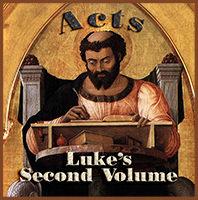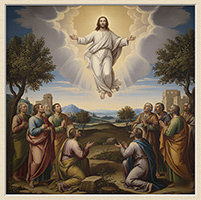The Book of Acts . . . Questions / Introduction
Questions
Before delving into the text of the book of Acts, let's answer a few preliminary questions to help familiarize yourself with the author and what Luke had written.
Who was Luke? Although Paul is often referred to as Apostle Paul, how do many call Luke? (a) Apostle Luke; (b) Doctor Luke; (c) Saint Luke; (d) Luke the Evangelist; (e) Teacher Luke; (f) Pastor Luke; (g) Theologian Luke; . . . Here's the answer.
Was Luke one of the twelve disciples who Jesus called to follow him?
How much was written by him? Paul wrote thirteen books of the Bible; John wrote four. Luke, it's believed, wrote two volumes of one book: the Gospel of Luke and the book of Acts. Counting the words of the New Testament, which of the three authors wrote the most Scripture? . . . Here’s that question’s answer.
What did he write? Do you recall key verses from previous readings and studies of Luke’s book of Acts? Here are a few:
Acts 1:8; 1:9; 2:4; 2:21; 2:38; 4:12; 7:59–60; 9:3; 13:38; 16:31; 17:24; 20:28; 22:16; 24:16; 27:22; 28:31.
Introduction to Luke the Author
Glad you've joined us to study the account of a man who apparently never laid eyes upon the Lord Jesus personally, but who performed a skillful job of researching the accounts (in his first volume, the gospel) of Christ Jesus' birth, life, death, and resurrection, then (in his second volume, the book of Acts) the history and development of the first churches. In both accounts, Luke the evangelist communicated them in a most orderly way. His book of Acts traces the history of Christ's followers, down to the author's own day, some time after the middle of the first century AD. Luke the author was a doctor and a traveling companion of Paul; his second inspired account (Acts) is the only recorded history of the birth of the church. Luke was a Gentile; the only Gentile to have written a biblical work. Furthermore, he was the only physician among the writers and has been acclaimed as having been a great historian.
Luke is often neglected as a theologian. This is unfortunate because he has a very developed theology and also wrote a larger portion of the New Testament than any other author. The main theological emphasis of the book of Acts is the Holy Spirit. The book begins with Jesus' promise of the Holy Spirit, which is later fulfilled in reference to the Jews (ch. 2) then for the non-Jews (ch. 10).
Mentioned by name only three times in the New Testament, Luke was a Gentile physician. He avoided common Semitic or Hebraic expressions in both volumes, substituting for them expressions from the Septuagint, i.e., the Greek translation of it. While Matthew, Mark, and John had used Hebraic expressions, Luke used the Greek version of them. Interestingly, if Luke left his medical practice to become a missionary, and traveled for years with Apostle Paul, we can assume that he continued to be Paul's personal private physician; given the frequency of Paul's injuries, what a luxury that must have been for Paul.
Quite a remarkable man was Luke. Having recently studied Luke's gospel, we've learned much about Doctor Luke; but all of a sudden, through our upcoming study of Acts, we'll see him make his presence for many weeks and months to come, documenting first hand the ministries of many who started and contributed meaningfully to the development of the church. That's Luke the historian. But you've got to come back next week when we'll also see Theologian Luke, then Saint Luke; finally, we'll meet Pastor Luke, even Missionary Luke.
Introduction to the Book of “Acts”

Luke’s gospel account and his
second volume, Acts, were
written as a two-part work:
likely late AD 50s or early 60s.
The gospel of Luke and the book of Acts are two volumes of a single work: Luke-Acts. The combined work tells the story of how God invited, first the people of Israel, then the people of all nations, to follow Jesus. The form of Luke's history reflects that message. In his first volume — Luke's gospel — the movement is towards Jerusalem, the center of Jewish national life. In the second volume — his book of Acts — the movement is away from Jerusalem to other nations, closing with Paul proclaiming the kingdom of God in Rome, the capital of the empire. The emphasis of Acts is the importance of the day of Pentecost and being empowered to be effective witnesses for Jesus Christ.
Acts sheds light on the gift of the Holy Spirit who empowers, guides, teaches, and serves as our Counselor. Reading this book, we're to be enlightened and encouraged by the many miracles that were being performed by the disciples Peter, John, and Paul. It emphasizes obedience to God’s Word and the transformation that occurs as a result of knowing Christ. There are also many references to those who rejected the truth about the Lord Jesus Christ that the disciples had preached. The lust for power, greed, and many other vices of the devil are evidenced in the book of Acts.
The book of Acts was likely written between AD 61–64 to provide a history of the early church. Its first half deals primarily with the ministry of Peter in Jerusalem and Samaria (chapters 1–12) while the second half follows Paul on his missionary journeys throughout the Roman Empire (chapters 13–28). Acts is significant for chronicling the spread of the gospel, not only geographically but also culturally. It records the transition from taking the gospel to an exclusively Jewish audience — with Peter preaching to a small group in an upper room — to the gospel going out among the Gentiles, primarily under the ministry of the Apostle Paul. The transition is best illustrated by Peter’s vision in which he heard a voice telling him, “What God has cleansed, no longer consider unholy” (10:15). This led Peter to then share the gospel with many non-Jews. The lesson? God wants his message of hope and salvation to extend to all people — “in Jerusalem, and in all Judea and Samaria, and even to the remotest part of the earth” (1:8).
Both volumes cover about thirty years, each providing an outline of important events filled with details gained from the sources available to him. Luke had access to those sources as a co-worker and traveling companion of Apostle Paul. More importantly, in several places in Acts, Luke writes in the first person using "we," as in "we" did this or that, thereby documenting his ongoing presence and participation. Scholars call these personal account passages (e.g., Acts 16:10–18, from Troas to Philppi; 20:4–21:19, Philippi to Jerusalem; and 27:1–28:30, Caesarea to Rome) the "we passages." It's traditionally held that the author of Acts accompanied Paul on a few occasions during portions of his second and third missionary journeys. The "we passages" suggest that Luke took part in instructing people about the Christian message, possibly in performing miraculous healings as well.
Acts is the only biblical book that chronicles the history of the church immediately after Jesus’s ascension. This book provides a unique and detailed account of the ascension of the Lord Jesus, highlighting both its historical and theological significance for the early church. Acts 1:9-11 explicitly records Jesus being taken up before the disciples’ eyes, hidden by a cloud, and two angels declaring that He’d return in the same way. This event is pivotal for several reasons shown here.
As such, it provides us with a valuable account of how the church was able to grow and spread out from Jerusalem into the rest of the Roman Empire. In only three decades, a small group of frightened believers in Jerusalem became transformed into an empire-wide movement of people who'd committed their lives to Jesus Christ. Acts is divided into six parts, each one describing a successive phase in the expansion of the community of Jesus-followers outward from Jerusalem. The divisions between the parts are marked by variations on the phrase, The word of God continued to spread and flourish. At the end of each section is a summary statement (6:7; 9:31; 12:24; 16:5; 19:20; 28:30–31).
The book of Acts serves as a transition from the Old Covenant of law-keeping to the New Covenant of grace and faith, as evident in two key events: (1) Paul’s conversion was a dramatic example of the transition from the Old Covenant to the New; Paul admitted that, prior to meeting the risen Savior, he was the most zealous of Israelites and was blameless “as for righteousness based on the law, faultless” (Philippians 3:6b); (2) Peter’s vision of the sheet in Acts 10:9–15 is another sign of the transition from the Old Covenant — in this case the dietary laws particular to the Jews — to the New Covenant’s unity of Jew and non-Jew in one universal Church. The “clean” animals symbolizing the Jews and the “unclean” animals symbolizing the Gentiles, were both declared “cleansed by God" through the sacrificial death of Christ. No longer under the Old Covenant of law, both peoples became united in the "New Covenant of grace through faith" in the shed blood of Christ on the cross.
Applying “Acts” in Our Lives
What opportunities to share the gospel with newcomers and not-yet-believers will you find and respond to in the weeks to come as you study and discuss the book of Acts? In virtually every chapter, apostles such as Peter and Paul powerfully presented the gospel to individuals and people groups. The apostles who Luke portrayed in Acts shine with evangelistic zeal and dedication, showing a striking transition from the often misguided and fear-filled disciples that are revealed in all four gospels. Clearly the apostles’ faith in the death and resurrection of Jesus produced a noticeable change in their hearts through the power of the Holy Spirit.
Too often, our own lives don't reflect that essence of change. We struggle with fears over how others will react to our faith, or our intimidation about breaking out of our routines long enough to invest in the life of someone else who needs to learn and appreciate the gospel. Allow Acts to encourage you to walk more closely with God so that you'll comfortably make Christ’s name known with the same boldness and zeal that the apostles demonstrated.
God can do amazing things through ordinary people when he empowers them through his Spirit: He essentially took a group of fisherman and used them to turn the world upside down (Acts 17:6); he took a Christian-hating murderer and transformed him into the greatest Christian evangelist, the author of almost half the books of the New Testament; he used persecution to cause the quickest expansion of a "new faith" in the history of the world; and God can and does do the same through us — changing our hearts, empowering us by the Holy Spirit, and giving us a passion to spread the good news of salvation through Christ. If we try to accomplish these things in our own power, we'll fail. Like the disciples in Acts 1:8, which we'll cover next week, we're to wait for the empowering of the Spirit; then we're to go, in his powerful Spirit, and fulfill the Great Commission (Matthew 28:19–20).
Come along with us as we begin our hearty study of the book of Acts. As you read, study, and discuss it, may you never be the same. When you're ready to dig in, start here with the Hearty Boys Bible study of Acts.
- Q. 1 Assuming that you've read Acts at least once, what about it is meaningful to you? Is there an element of Acts that you're using today? If so, what is it?
- Q. 2 If Acts were dropped from the Bible, what would be missing from the story of God's redemptive work in history?
- Q. 3 Luke wrote Acts as a companion piece to his gospel to show how Christianity wasn't a threat to Rome, but rather the work of God's Spirit in building up a spiritual kingdom, one comprised of all who live by faith in Jesus. Today, do you believe that there are those who think that Christianity is a threat to our government? If so, what should our response be to them?
- Q. 4 Do you believe that there are spiritual forces opposed to God's Spirit regarding his building a spiritual kingdom? If so, what should be our response to those forces?
Intro Video: “The Book of Acts in 3 Minutes!” (Yes, three minutes)
† Watch this 3-minute video clip created by The Church at Brook Hills, in Alabama, as shown on Vimeo.com

